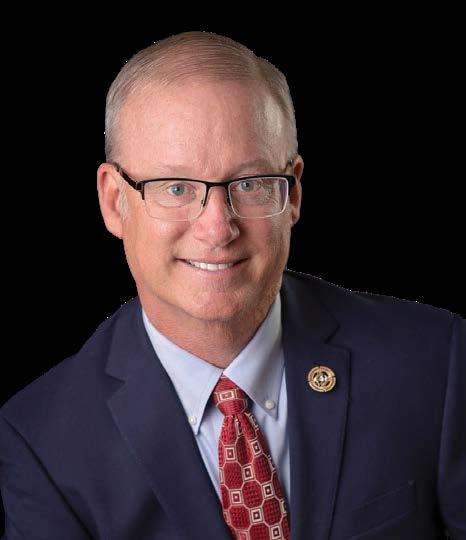
2 minute read
The Work of the ABA Continues
Representing the banks of Arkansas over the last 12 months has been a humbling experience for me. I have participated in exciting conferences, conventions, meetings, and zoom calls, but best of all, I have had the opportunity to meet many excellent bankers along the way. This is my last article as your Arkansas Bankers Association chair, and I am using it as a clarion call for your help and participation.
As the number of banks continues to decline in our state and across the country through mergers and acquisitions, we need to capitalize on the potential of the ABA. Our annual convention, the MEGA conference, group meetings, DC fly-ins, Emerging Leaders, Women in Banking—all these options allow you to be a voice in our industry. At the recent ABA Washington Summit, Arkansas was represented by only 16 bankers, although 1,500 people attended from 50 states. Farm Credit and credit unions are always well represented, and not coincidentally, our Congressional delegates do listen to them! It has never been more critical that we are heard. Although we are fortunate to live in a small state where we know our legislators personally and can pick up the phone and talk to them, visiting them in D.C. as an industry is essential, especially now, with the impact of Silicon Valley and Signature Bank failures—our delegation is asking Arkansas bankers for constructive suggestions to prevent this from happening again. We have great opportunities to give us the influence we need, and I urge each of you to get more involved in the Arkansas Bankers Association to affect the changes important to us.
Several current hot topics are vital to our industry, and we have talked about some of them for years. Undoubtedly, new regulations will emerge as part of the fallout from SVB. The cannabis industry is another issue: The SAFE Act would give banks a safe harbor for banking with cannabis-related businesses. Thirty-seven states have legalized cannabis for medical use, and while we are not officially supporting the legalization of marijuana, an unbanked cannabis industry is not a viable option.
Equal Credit Opportunity for Rural America (ECORA) has become the Access to Credit for our Rural Economy (ACRE) Act. ACRE excludes from gross income the interest received by qualified lenders on loans secured by farm real estate and home mortgage loans in rural communities of no more than 2,500 people. The passage of ACRE would enable us to lower interest rates by 1.5-2.0%, which would benefit the agricultural business in a time of rising interest rates and input costs. This is important in the Arkansas agricultural economy, so we also have introduced a similar bill at the state level.
Speaking of the agricultural industry, a draft of the new farm bill is in the works, and this crucial piece of legislation needs input from Arkansas banks and farmers.
We have requested that the FSA guaranty crop production loan amount be increased from $1.75 million to $3.5 million because with increased land prices and input costs, the guaranty amount must increase. Also, we have asked to expand programs available for first-time farmers.
Other federal issues include CFPB’s proposal to change credit card late fees from a maximum of $30 for first-time violations to $8; small business data collection requirements from CFPB (Section 1071 of the Dodd-Frank Act); the introduction of ESG legislation; and the list goes on and on.
In closing and on a personal note, I would be remiss if I did not recognize a board member from my bank who recently received the 60 Years in Banking Milestone Award. Paula Blackwell has served on the Farmers Bank and Trust board since 1987 and was the President and CEO of Piggott State Bank from 1990 to 2015, where she still serves on the Board of Directors. Over the years, she has been a great role model for many bankers, including me. Congratulations to Paula for reaching this significant milestone!
Thank you for allowing me to serve you as your chair this past year. The honor has been mine.






